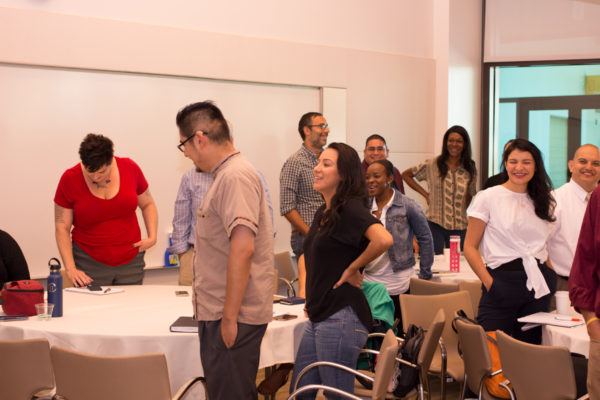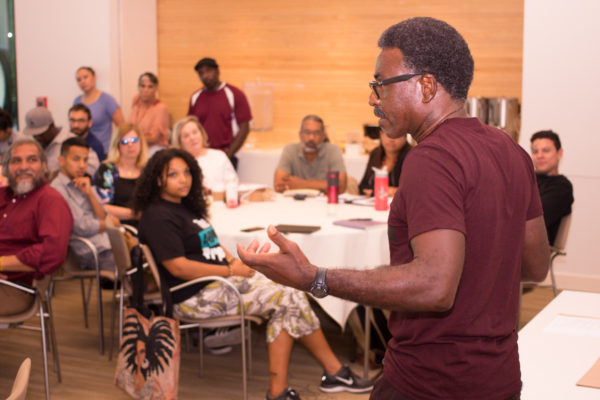
About Community Intelligence Workshops
Community Intelligence Workshops are – an Ongoing Public/Mental Health Professional Workforce Development Education Series – Designed to – overtime – Cover the Core Competencies of Public/Mental Health Professionals including the following areas: analytical skills; policy development/program planning skills; communication skills; cultural competency skills; public health and public mental health science skills; financial planning and management skills; and, leadership and systems thinking skills.

Conferences
Uplifting Women and Girls of Color in California Conference (held annually in October);
Uplifting Men and Boys of Color in California Conference (held annually in October);
Elevating Maternal, Paternal, Infant, Child and Adolescent Health in Communities of Color Conference (held annually in March);
Convenings and Workshops Topics (refer to
calendar):
1. Civil Rights
a. Education as Resistance and Resilience
b. Honoring Martin Luther King, Jr. and the impact of The Civil Rights
Movement on Public Health
c. Intergenerational Trauma
d. Improving Public Health, Mental Health, Community Safety and Wellbeing in
African American Communities
2. Maternal, Paternal, Infant, Child and Adolescent Health
a. The Positive Impact of Involved Fathers on Family Health, Safety and
Welfare;
b. Developing Men, Father and Fatherhood-friendly Principles and Practices for
your Family Serving Organization;
3. Structural Racism
a. Defining Structural Racism and How it Impacts Public Health
b. Discussing the Impact of Slavery and the Transatlantic Slave Trade on
Health, Safety and Welfare; Public Health; Mental Health and Wellbeing in
Indigenous American, African American, Asian/Pacific Islander American
and Latino American communities;
c. Unpacking Social, Historical, Institutional, Racialized, Trauma: How has
S.H.I.R.T. impacted Health, Safety and Welfare; Public Health; Mental
Health and Wellbeing in Communities of Color;
d. Addressing Racism and Promoting Social Justice in Public Health and Mental
Health;
4. Injury Violence and Trauma
a. Developing Multisectoral Approaches to Addressing Domestic Violence;
b. Homicide Victimization and Domestic Violence
c. Defining the Impact of Injury, Violence and Trauma on Health, Safety and
Welfare; Public Health; Mental Health and Wellbeing of Men and Boys of
Color;
d. Defining the Impact of Injury, Violence and Trauma on Health, Safety and
Welfare; Public Health; Mental Health and Wellbeing of Women and Girls of
Color;
e. Addressing the Impact of Injury, Violence and Trauma on Health, Safety
and Welfare; Public Health; Mental Health and Wellbeing of Men and Boys of
Color;
f. Addressing the Impact of Injury, Violence and Trauma on Health, Safety
and Welfare; Public Health; Mental Health and Wellbeing of Women and
Girls of Color;
5. The Built Environment
a. Illuminating the Intersection of Injury, Violence and Trauma x Zoning, Land
Use and Urban Planning;
b. Highlighting Opportunities to Utilize Zoning; Land Use Ordinances, Policies
and Practices; Community Investments; and; Code Enforcement to Improve;
c. Environmental Justice and Injury, Violence and Trauma: Shedding Light on
the Connections between Environmental Justice and Injury, Violence and
Trauma;
6. Health Policy
a. Overview of Public Health in the United States of America;
b. The U.S. Mental Health Landscape;
c. Race, Gender and Mobility;
d. Developing Sustainable Networks and Coalitions;
Who should consider attending the Ongoing Public Health and Mental Health Professional Workforce Development Education Series?
These Public Health and Mental Health Professional Workforce Development Education Series workshops are intended for:
(1) Public Health Professionals including DrPH’s, PhD’s, MD’s, MPH’s, MS, BA’s, Nurses, Health Officers, Policy Analysts, Educators & Epi’s;
(2) Mental Health Professionals including MD’s, PhD’s, PSYD’s, MSW’s, LCSW’s, LPC’s, LMFT’s, LCADAC’s, FNP’s, ADAC’s & Peer Counselors;
(3) Education Professionals including EdD’s, Professors, Students, Psychologists, Teachers, Counselors, School Safety/Climate Advocates;
(4) Family Health Professionals including Infant/Maternal/Paternal/Child/Adolescent Health and providers of family/youth services;
(5) Injury & Violence Prevention Professionals including Child/Domestic/Family/Intimate Partner and un/intentional injury prevention;
(6) Other Public Service Professionals including Housing Advocates, Urban Planners, Law Enforcement, Parks and Rec.

